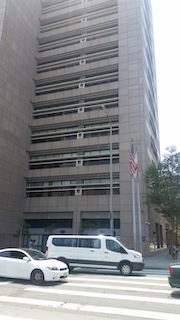In determining restitution awards, judges generally are generous to victims in ensuring that defendant fully recompenses the victim. If one is representing a defendant, this can be frustrating because it can seem victims seek damages unrelated to the crime. In other words, it can seem that victims sense the judge’s inclination to believe the victim over the defendant, so victims falsify and exaggerate their losses.
The following case out of Los Angeles County, from the Pasadena Superior Court, seems to recognize this reality, but the Second Appellate District Court ironed out the dispute.
Obadiah Grandpierre inflicted thousands of dollars of damage by stealing Shawn Vessel’s identity. Police saw Grandpierre at an ATM while a codefendant sat in Grandpierre’s running car. Police found $2,480 in cash and 16 debit cards on Grandpierre. Police also found a credit card reader in the car and another in the codefendant’s hotel room.
A felony complaint alleged Grandpierre and the codefendant committed two counts of identity theft (Penal Code § 530.5(a)) and one count of forgery of an access card (Penal Code § 484f(a)). Grandpierre pleaded no contest to the three counts and the judge, Terry Lee Smerling, placed Grandpierre on three years of formal probation while suspending imposition of the sentence.
One of the victims of Grandpierre’s identity theft was Shawn Vessels and a restitution hearing was held on September 10, 2020. Vessels explained that he owned 30 percent of a company called Electrical Advantage Engineering (EAE). He sought restitution for himself and the company.
 CA 2nd Appellate District LA
CA 2nd Appellate District LA
Judge Smerling awarded Vessels restitution for 19 hours of time lost from work, twelve of which were spent regarding his credit and business phone number that Grandpierre stole. The judge determined that such twelve hours would have been billable hours had he been able to focus on his business instead of Grandpierre’s mischief. Vessels bills clients at $195 per hour. So the company lost $2,340.
Vessels also testified that he spent considerable additional time outside work hours “dealing with a variety of agencies and things.” He used up an entire sick day, which the judge valued at $420, or seven hours multiplied by $60 per hour.
Grandpierre argued that the restitution to EAE was improperly awarded because Vessels testified he ultimately worked the twelve hours, although after work hours. The judge responded to this argument by saying Vessels was “greatly inconvenienced.” Grandpierre responded, “I don’t doubt that, but the value of his inconvenience is not $195 per hour.” The court explained, acknowledging Grandpierre’s point: “Arguably, but the time he spent off hours, he could have been doing other things. He could have been billing for other people."
Grandpierre then appealed the restitution award of twelve hours at $195 per hour to the Second Appellate District as an abuse of discretion. Grandpierre did not dispute the $420 awarded for Vessels using a sick day to sort out the chaos caused by Grandpierre’s identity theft.
The Second Appellate District began its analysis by reminding the reader that restitution is “based on the amount of loss” the victim claims and should “fully reimburse “ the victim for every economic loss the defendant’s criminal conduct caused. Penal Code § 1202.4(f). See also People v. Carbajal (1995) 10 Cal. 4th 1114, 1121 (trial courts have discretion to order restitution as condition of probation even when loss not necessarily caused by criminal conduct underlying conviction). There is no abuse of discretion unless the court’s ruling falls outside the bounds of reason. People v. Giordano (2007) 42 Cal. 4th 644, 663.
A corporation, partnership or other commercial entity is entitled to restitution if it is a direct victim of a crime. Penal Code § 1202.4(k). Lost wages or loss profits are compensable due to a victim’s injury. Penal Code § 1202.4(f)(3)(D). Expenses to make a victim of identity theft whole are also compensable. Penal Code § 1202.4(f)(3)(L).
Courts have liberally construed victims’ right to restitution. People v. Stanley (2012) 54 Cal. 4th 734, 737. Courts expansively interpret this meaning of “economic loss.” In re Alexander A. (2011) 192 Cal. App. 4th 847, 854, fn. 4.
The standard of proof at a restitution hearing is preponderance of the evidence. People v. Gemelli (2008) 161 Cal. App. 4th 1539, 1542. A victim’s statement of economic loss is prima facie evidence of loss. Id., at 1543. To rebut a prima facie case, the defendant has the burden of disproving the amount of losses the victim claimed.
Turning to Grandpierre’s claim that the trial court abused its discretion, the appellate court found no abuse of discretion because Grandpierre did not disprove the prima facie case made out by Vessels or provide a viable alternative theory of valuation. Moreover, Vessels’ act of working the extra twelve hours off-hours to recoup his losses do not foreclose restitution.
For example, in People v. Dalvito (1997) 56 Cal. App. 4th 557, the Court of Appeal rejected a defendant’s argument that a victim of theft who mitigated his loss through bankruptcy suffered no economic loss At the time of the loss, the victim had not yet paid for the stolen item, a necklace. He later declared bankruptcy, which discharged his debt for the necklace. The appellate court affirmed the trial court’s restitution award for the value of the necklace to the victim. Id. at 559-560, 562.
The citation for the Second Appellate District Court ruling discussed above is People v. Obadiah Grandpierre (2nd App. Dist., 2021) 66 Cal. App. 5th 111, 280 Cal. Rptr. 3d 730.
For more information about restitution issues, please click on the following articles:
 CA 2nd Appellate District LA
CA 2nd Appellate District LA